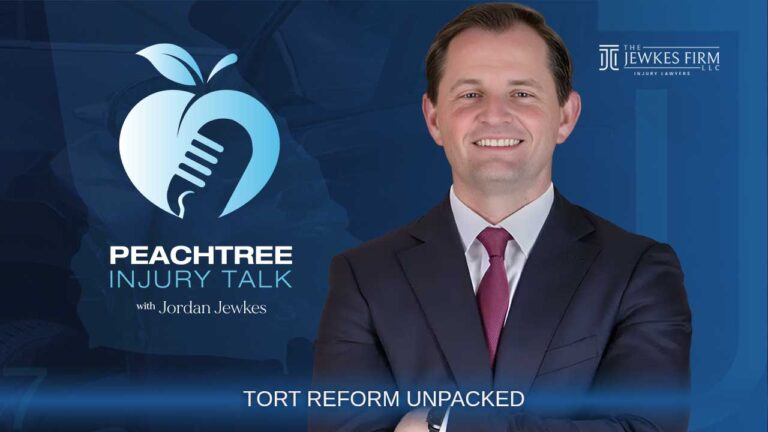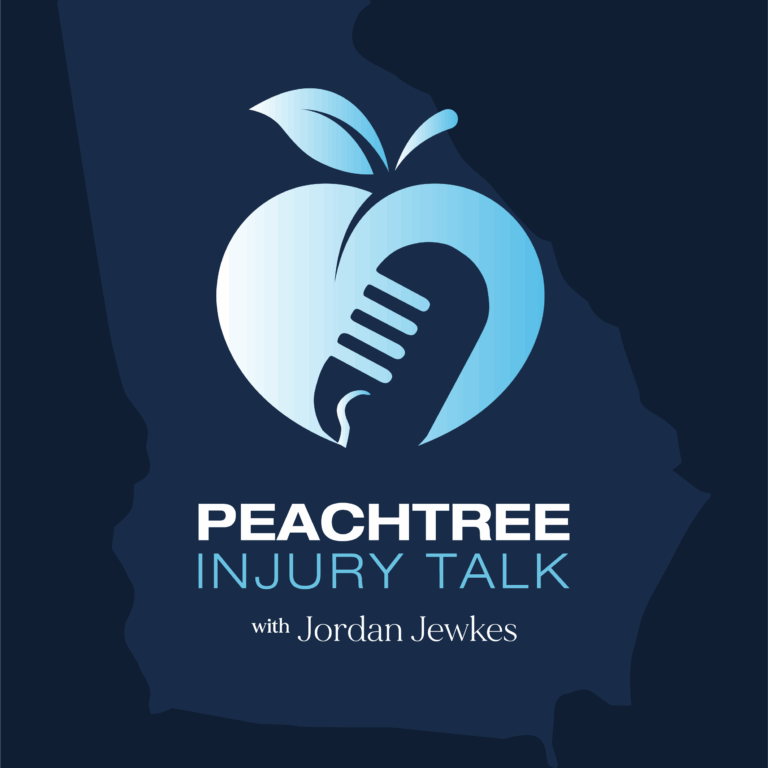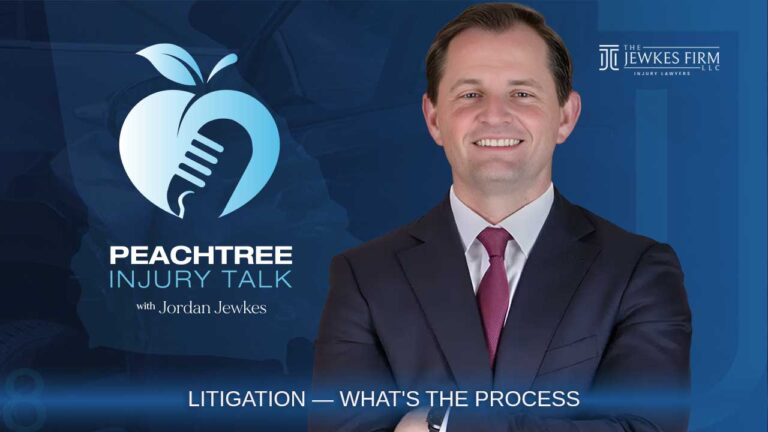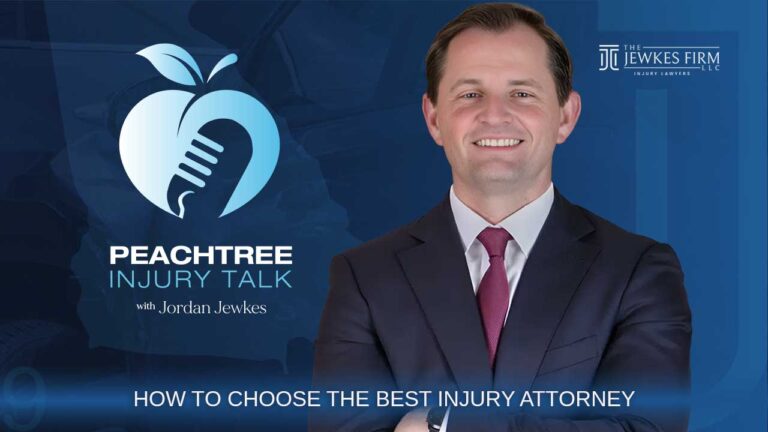
Tort Reform Unpacked — What It Is, Why It Matters, and Who’s Impacted
In this episode, Jordan shares his perspective on why tort reform often benefits large corporations at the expense of individual rights and access to fair
Home | Podcasts | Peachtree Injury Talk | The Hidden Dangers — Common Social Media Mistakes After an Auto Accident
Peachtree Injury Talk with Jordan Jewkes
In this episode of Peachtree Injury Talk, attorney Jordan Jewkes and Kevin Rosenquist dive deep into the risks and mistakes associated with social media use after an auto accident. Jordan explains how social media can impact personal injury claims, both positively and negatively. He highlights the dangers of misleading attorney advertisements, the long-term effects of social media posts, and how insurance companies scrutinize your online presence. Whether it’s sharing personal experiences or the risk of posting something that could be used against you, the episode stresses the importance of being mindful of what you share online during the claims process.
| 00:00 | Narrator: Welcome to Peachtree Injury Talk with attorney Jordan Jewkes. |
| 00:04 | Kevin Rosenquist: Hello and welcome to Peachtree Injury Talk with attorney Jordan Jewkes. Jordan strives to give injured victims a voice and provides strong advocacy against an often broken system. I’m your host, Kevin Rosenquist, and today’s episode is Hidden Dangers—Common Social Media Mistakes After an Auto Accident. Jordan, good to see you again. |
| 00:24 | Jordan Jewkes: Hey, happy to be here. |
| 00:26 | Kevin Rosenquist: All right, so let’s get into it. Social media is everywhere—some positives, some negatives. How has the rise of social media changed the landscape of auto accident injury claims? |
| 00:42 | Jordan Jewkes: That’s a really good question. I'd say in two major ways. First, social media has become an ongoing autobiography. People post details about their lives—photos, updates, opinions—and once it’s out there, it stays. You're basically handing over a year’s worth of photo albums and journal entries. Second, it’s introduced a flood of personal injury attorney advertising, but not always from real law firms. Many of these are lead generation companies—businesses that aren’t attorneys at all. They collect info from people who’ve been injured and sell it off to law firms, often out-of-state. It’s deceptive, and it’s become a huge presence on social media. |
| 01:48 | Kevin Rosenquist: What are some dangers of working with those types of services? |
| 01:55 | Jordan Jewkes: Not all of them are dangerous, but there are big risks. They might promise you a certain settlement amount, but then hand your case to someone with no real expertise in your state. That means missed deadlines, poor representation, and lost opportunities. If you found your attorney by clicking an ad promising "MAX SETTLEMENTS!"—you need to slow down and do some local research. If you don’t know the name of the attorney in the ad, you’re probably on the wrong path. |
| 02:47 | Kevin Rosenquist: I got duped once on Instagram. I ordered some shirts I liked—never got them. |
| 02:57 | Jordan Jewkes: Yeah, and that’s the thing. The advertising is slick. You’ll see things like “We get our clients $100,000 settlements,” and for someone sitting on their couch, out of work and in pain, it’s tempting. But it’s a funnel—you don’t really know who’s on the other side. |
| 04:12 | Kevin Rosenquist: So how exactly can social media posts hurt someone’s personal injury case? |
| 04:18 | Jordan Jewkes: Great question. We advise all our clients to be extremely careful about what they post. Insurance companies will absolutely look at your Facebook, Instagram, TikTok—whatever is public. And like you hear on TV, “Anything you say can and will be used against you in court”—same goes for what you post. |
| 04:59 | Kevin Rosenquist: That's a great way to put it—just add "on social media" to that phrase. |
| 05:04 | Jordan Jewkes: Exactly. Posts, photos, videos—those are statements. And here’s the kicker: if you try to delete them after the fact, you could face sanctions for tampering with evidence. So think before you post. |
| 05:28 | Kevin Rosenquist: Are there any cases where social media can help a personal injury claim? |
| 05:33 | Jordan Jewkes: Maybe—but rarely. If you're being honest and transparent, it can show authenticity. But it’s a slippery slope. The safer move is not to post about your case or your physical condition at all. Post about your cat or your dinner, fine. But if you're injured and claiming damages, and then post about water-skiing or snowboarding—even if you’re struggling through it—the defense will use that against you. |
| 06:34 | Kevin Rosenquist: What other mistakes do people make with social media? |
| 06:43 | Jordan Jewkes: Oh, plenty. Here’s one: we had a case where our client was in a head-on collision. The other driver blamed her. Later, that driver posted some really unflattering and vulgar comments about our client online—plus some things that contradicted what his attorney was saying in court. We showed those posts to his lawyer, and they settled the case quickly. Social media hurt them badly. |
| 08:05 | Kevin Rosenquist: People don’t always think things through. We’ve all said things we regret, but social media adds permanence. |
| 08:19 | Jordan Jewkes: Exactly. Good rule of thumb: think twice before posting. Once it's up, it’s out there. Even beyond court, just in life—it’s a wise habit. |
| 08:37 | Kevin Rosenquist: Was there a time when social media wasn't considered admissible in court? |
| 08:44 | Jordan Jewkes: In the early days, yes. There was debate over what was private and what wasn’t. But today, courts generally view social media posts as admissible—especially if they relate to your injury, your activity level, or the events of the accident. Photos from 20 years ago? Probably not relevant. But anything recent that ties to the case? Very likely admissible. |
| 09:30 | Kevin Rosenquist: Yeah, it's become normalized in a lot of settings. Employers check social media now. Everyone does. |
| 09:49 | Jordan Jewkes: Right. Like it or not, social media reflects who you are—or at least who people think you are. So if someone claims major injury but posts about dancing at a wedding, that’s going to raise questions. There are even services that do a deep dive on social profiles and give attorneys a psychological profile based on that. It’s detailed and very telling. |
| 10:21 | Kevin Rosenquist: Have you ever had to check a client’s social media and find something... troubling? |
| 10:44 | Jordan Jewkes: Oh, for sure. One common scenario is the "beach photo"—a client posts a vacation pic with their feet up, ocean view. Then at deposition, they forget they left the state, and the defense has that post ready to go. Even something innocent like relaxing on the beach can be spun into “They must not be that hurt.” So it's not that people shouldn't live their lives—but they need to be able to explain it clearly and truthfully if it comes up. |
| 12:29 | Kevin Rosenquist: That makes sense. So sometimes it's not the post, it's the inconsistency? |
| 12:37 | Jordan Jewkes: Exactly. A simple mistake like forgetting you went to Florida can look like a lie under oath. And to insurance companies, an inconsistency is a credibility hit. So if you post it, remember it, and be honest about it. |
| 12:46 | Kevin Rosenquist: Do you have examples of social media actually helping a case? |
| 12:54 | Jordan Jewkes: Yeah. Sometimes it’s not the posts—it’s the absence of them. If someone was active on social media—posting about concerts, events, vacations—and then suddenly stops after a wreck, that can support the idea that their lifestyle changed because of the injury. It's subtle, but it can help. |
| 14:01 | Kevin Rosenquist: That’s interesting. I wouldn’t have thought of that. |
| 14:04 | Jordan Jewkes: Yeah, it’s about patterns. But again, the safest move? Be cautious with what you post. That’s the core advice. |
| 14:08 | Kevin Rosenquist: Anything else clients should know beyond just watching what they post? |
| 14:19 | Jordan Jewkes: Just be authentic. If you’re genuinely injured, your case should reflect that. But don’t post things that contradict your claim. And don’t expect a high-dollar settlement if you’re documenting an active, pain-free lifestyle online.s Remember: the insurance company will look for anything they can use to reduce or deny your claim. And nine times out of ten, they’ll bring up social media in mediation or settlement talks. |
| 15:31 | Kevin Rosenquist: That’s the last thing you want to hear: “Have you seen your client’s Instagram?” |
| 15:33 | Jordan Jewkes: Right. And thankfully, we’re usually prepared for it. But again—it’s avoidable. Be careful, be thoughtful, and when in doubt, just don’t post. |
| 15:58 | Kevin Rosenquist: Perfect way to wrap it up: be careful with your social media. |
| 16:02 | Jordan Jewkes: That’s right. |
| 16:04 | Kevin Rosenquist: Thanks for joining us on Peachtree Injury Talk with Jordan Jewkes. To connect with Jordan and his team, visit jewkesfirm.com (https://www.jewkesfirm.com). Please like and subscribe to our channel and leave us a review. Jordan, always great to see you—thanks so much for your time. |
| 16:16 | Jordan Jewkes: Thank you, sir. Appreciate it. |
| 16:18 | Narrator: Thanks for watching. Be sure to hit that like and subscribe button and leave us a review in the comments. |

Peachtree Injury Talk is a podcast by Kevin Rosenquist featuring legal insights and practical advice from Georgia-based attorney Jordan Jewkes. The show focuses on personal injury law, offering listeners expert guidance on navigating insurance claims, understanding legal processes, and protecting their rights after an accident. Each episode dives into real-life case examples, common challenges injured individuals face, and actionable tips for dealing with insurance companies and legal hurdles.
Episode Summary
In this episode of Peachtree Injury Talk, attorney Jordan Jewkes explains how injury claims are handled when the at-fault driver gives a false or skewed version of an accident. He outlines how people may lie—or misremember—to avoid blame, and why quick action is critical. His firm uses tools like surveillance footage, dash cams, body cams, and social media to uncover the truth. He stresses the importance of documenting the scene, hiring an attorney early, and relying on facts—not feelings—to win a disputed liability case.
Timestamps
00:00 – Introduction to Peach Tree Injury Talk
00:32 – When at-fault driver lies about accident
02:04 – Different perspectives on accident facts
02:58 – Handling truly disputed liability cases
04:02 – Collecting witness statements and video
05:56 – Importance of timely evidence preservation
08:54 – Challenges with video camera evidence
10:46 – Tools to protect client’s story in disputes
14:32 – Dealing with untruthful drivers at scene
16:36 – Documenting accident scene and damages
17:57 – Exposing lies and social media evidence in court
19:58 – Closing remarks and contact information
About the Show
Peachtree Injury Talk is hosted by attorney Jordan Jewkes, who is dedicated to giving injury victims a voice and fighting for their rights against an often unfair system. Each episode provides valuable legal insights and practical advice for those navigating personal injury claims.

The Hidden Dangers of Social Media After an Accident breaks down the hidden dangers of social media after an auto accident. The conversation highlights how social media can impact personal injury claims, both positively and negatively.
Jordan begins by noting two significant ways social media has influenced the landscape of auto accident injury claims. First, social media serves as a personal diary for many people, where they share photos, opinions, and life updates. Once posted, this content remains accessible, and lawyers can use it in legal cases. Second, the rise of personal injury attorney ads on social media has led to a surge in misleading advertisements. Many of these ads are from lead generation companies, not actual attorneys, and they collect personal injury details only to sell them to law firms. This practice can lead to poor legal representation for the injured person.
Jordan explains that while not all of these lead-generation services are harmful, there are risks. Some may promise high settlements but fail to provide proper legal counsel, which could result in missed deadlines, poor representation, and lost opportunities. He advises potential clients to do local research and be cautious of ads that promise large settlements, as they often lead to the wrong path.
The conversation shifts to how social media posts can directly hurt a personal injury case. Insurance companies scrutinize social media profiles to find inconsistencies that could harm a claim. Jordan stresses the importance of being mindful about what you post, as courts can use anything shared online as evidence. Even trying to delete posts later could lead to sanctions for evidence tampering. The safest advice is to avoid posting anything related to the case or physical condition, though posting about mundane things like pets or meals is generally fine. However, posting about activities that contradict an injury claim—such as engaging in sports or active hobbies—can severely damage the case.
Jordan also shares an example where social media worked against someone’s case. A driver involved in a head-on collision made vulgar online posts that contradicted their defense attorney’s claims, ultimately leading to a quick settlement in favor of the injured party. This shows how social media can be a powerful tool, but it can also backfire if not handled carefully.
Another point discussed is how social media content has become admissible in court. While social media posts were once debated over their privacy status, courts now generally accept them as evidence, especially when they pertain to injury claims or the events of the accident. As Jordan explains, a photo from years ago may not be relevant, but recent posts about the accident or the person’s recovery could be crucial in court.
They also touch on a common scenario where social media can indirectly help a case. If an active person suddenly stops posting after an accident, it can serve as evidence of the lifestyle change caused by the injury, which could support the claim. However, Jordan reiterates that the safest approach is to be cautious and avoid posting about the injury or recovery process.
The episode concludes with advice for clients to be authentic and cautious about social media. Jordan emphasizes that insurance companies often use social media to challenge claims, and clients should avoid posting anything that could contradict their injury claims. Ultimately, he encourages people to think carefully before sharing anything online, especially in the context of a personal injury case.
This episode serves as a reminder of the potential consequences of social media in legal matters and offers practical advice for those dealing with personal injury claims. For more information, reach out to The Jewkes Law Firm at (770) 771-5130.
This show is designed to deliver general information regarding the law. Our guests will not provide tailored legal advice. If you have a personal issue and need legal support, get in touch with us for a free consultation with a Jewkes Firm attorney.
Subscribe to our newsletter for essential updates and expert legal advice.

In this episode, Jordan shares his perspective on why tort reform often benefits large corporations at the expense of individual rights and access to fair

In this episode, Jordan Jewkes explains the litigation process, why it can be time-consuming, and what injured victims should expect when filing a lawsuit. He

In this episode of Peachtree Injury Talk, attorney Jordan Jewkes discusses the important factors to consider when choosing the best injury attorney. Jordan emphasizes the
The information you obtain at this site is not, nor is it intended to be, legal advice. You should consult an attorney for advice regarding your individual situation. Contacting us does not create an attorney-client relationship.
